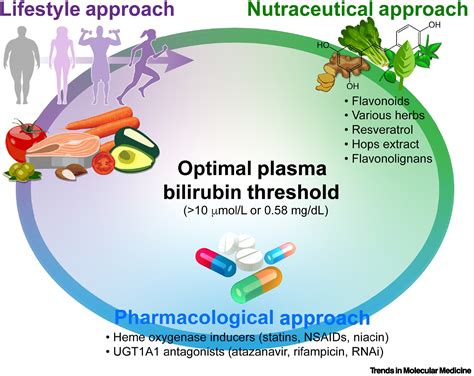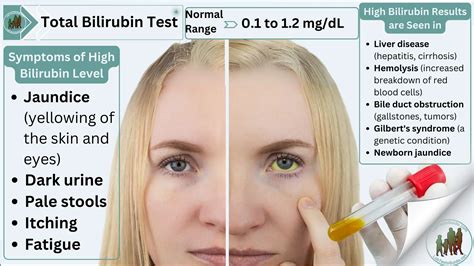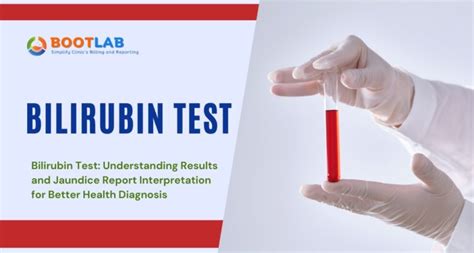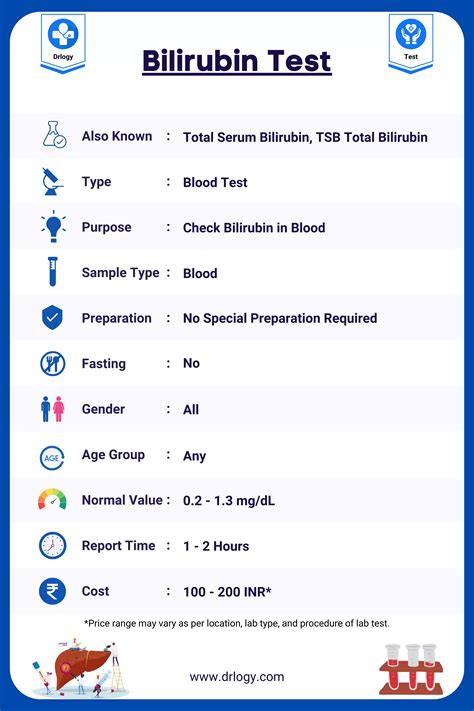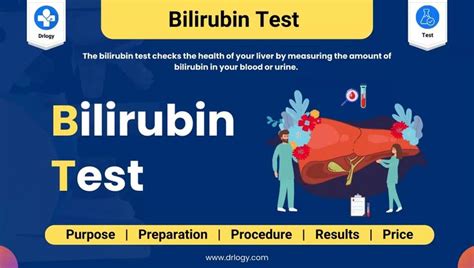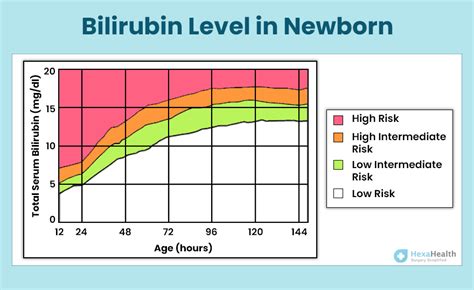Bilirubin is a yellow compound that occurs in the normal catabolic pathway that breaks down heme in red blood cells. The liver plays a crucial role in removing bilirubin from the blood, and any abnormalities in this process can lead to a range of health issues. Understanding the importance of bilirubin and its impact on our health is essential for maintaining overall well-being. In this article, we will delve into the world of bilirubin, exploring its significance, the role of bilirubin tests, and what the results can indicate about our health.
Bilirubin tests are a crucial diagnostic tool used to assess liver function and detect any potential issues related to bilirubin production or removal. These tests can help identify conditions such as jaundice, liver disease, and hemolytic anemia, allowing for early intervention and treatment. The importance of bilirubin tests cannot be overstated, as they provide valuable insights into the health of our liver and our overall well-being. By understanding the facts about bilirubin tests, we can better appreciate the significance of this diagnostic tool and take proactive steps to maintain our health.
The process of bilirubin production and removal is complex, involving multiple organs and systems in the body. When red blood cells reach the end of their lifespan, they are broken down, and the heme is converted into bilirubin. The liver then conjugates the bilirubin, making it water-soluble, and it is excreted into the bile. Any issues with this process can lead to elevated bilirubin levels, which can be detected through a bilirubin test. In the following sections, we will explore the facts about bilirubin tests, including their benefits, working mechanisms, and interpretation of results.
Bilirubin Test Benefits
Bilirubin tests offer several benefits, including early detection of liver disease, diagnosis of hemolytic anemia, and monitoring of jaundice treatment. By measuring bilirubin levels, healthcare professionals can assess liver function and identify potential issues before they become severe. The benefits of bilirubin tests can be summarized as follows:
* Early detection of liver disease: Bilirubin tests can help identify liver disease in its early stages, allowing for prompt treatment and management.
* Diagnosis of hemolytic anemia: Elevated bilirubin levels can indicate hemolytic anemia, a condition characterized by the premature breakdown of red blood cells.
* Monitoring of jaundice treatment: Bilirubin tests can be used to monitor the effectiveness of jaundice treatment and adjust the treatment plan as needed.
How Bilirubin Tests Work
Bilirubin tests typically involve a blood sample, which is then analyzed to measure the levels of bilirubin in the blood. The test can detect both conjugated and unconjugated bilirubin, providing valuable information about liver function and bilirubin metabolism. The working mechanism of bilirubin tests can be explained as follows:
* Blood sample collection: A blood sample is collected from the patient, usually through a vein in the arm.
* Laboratory analysis: The blood sample is then sent to a laboratory for analysis, where the levels of bilirubin are measured using specialized equipment.
* Result interpretation: The results of the bilirubin test are then interpreted by a healthcare professional, who will assess the levels of bilirubin and determine the underlying cause of any abnormalities.
Interpreting Bilirubin Test Results
Interpreting bilirubin test results requires a thorough understanding of the normal ranges and the underlying causes of any abnormalities. The results can indicate a range of conditions, from liver disease to hemolytic anemia. The following factors can influence the interpretation of bilirubin test results:
* Normal ranges: The normal range for bilirubin levels varies depending on the laboratory and the individual, but generally falls between 0.1 and 1.2 mg/dL.
* Elevated levels: Elevated bilirubin levels can indicate liver disease, hemolytic anemia, or other conditions that affect bilirubin metabolism.
* Decreased levels: Decreased bilirubin levels are less common, but can indicate conditions such as liver cirrhosis or liver failure.
Common Conditions Diagnosed with Bilirubin Tests
Bilirubin tests can help diagnose a range of conditions, including:
* Jaundice: A condition characterized by yellowing of the skin and eyes, often caused by elevated bilirubin levels.
* Liver disease: Bilirubin tests can help diagnose liver disease, including conditions such as hepatitis and cirrhosis.
* Hemolytic anemia: A condition characterized by the premature breakdown of red blood cells, often caused by elevated bilirubin levels.
Bilirubin Test Types
There are several types of bilirubin tests, each with its own specific application and purpose. The most common types of bilirubin tests include:
* Total bilirubin test: Measures the total level of bilirubin in the blood, including both conjugated and unconjugated bilirubin.
* Direct bilirubin test: Measures the level of conjugated bilirubin in the blood, which can indicate liver disease or bile duct obstruction.
* Indirect bilirubin test: Measures the level of unconjugated bilirubin in the blood, which can indicate hemolytic anemia or other conditions.
Bilirubin Test Preparation
Preparing for a bilirubin test is relatively straightforward, but there are several factors to consider to ensure accurate results. The following tips can help prepare for a bilirubin test:
* Fasting: Fasting is not typically required for a bilirubin test, but it may be recommended in certain cases.
* Medications: Certain medications can affect bilirubin levels, so it is essential to inform the healthcare professional about any medications being taken.
* Lifestyle factors: Lifestyle factors such as diet and exercise can also affect bilirubin levels, so it is essential to maintain a healthy lifestyle before the test.
Bilirubin Test Risks and Complications
While bilirubin tests are generally safe and effective, there are some risks and complications to consider. The following risks and complications can occur:
* Bleeding: Bleeding is a potential risk of any blood test, including bilirubin tests.
* Infection: Infection is a potential risk of any blood test, including bilirubin tests.
* Allergic reactions: Allergic reactions to the test materials or equipment are rare but can occur.
Conclusion and Next Steps
In conclusion, bilirubin tests are a valuable diagnostic tool used to assess liver function and detect potential issues related to bilirubin production or removal. By understanding the benefits, working mechanisms, and interpretation of results, we can better appreciate the significance of this diagnostic tool and take proactive steps to maintain our health. If you have any concerns about your liver health or bilirubin levels, it is essential to consult with a healthcare professional who can provide personalized guidance and recommendations.
We invite you to share your thoughts and experiences with bilirubin tests in the comments below. Have you had a bilirubin test recently? What were your results, and how did you prepare for the test? Your input can help others who may be going through a similar experience. Additionally, if you found this article informative and helpful, please share it with your friends and family who may benefit from this information.
What is the normal range for bilirubin levels?
+
The normal range for bilirubin levels varies depending on the laboratory and the individual, but generally falls between 0.1 and 1.2 mg/dL.
What are the risks and complications of bilirubin tests?
+
The risks and complications of bilirubin tests include bleeding, infection, and allergic reactions to the test materials or equipment.
How do I prepare for a bilirubin test?
+
To prepare for a bilirubin test, it is essential to inform your healthcare professional about any medications you are taking and to maintain a healthy lifestyle before the test. Fasting may also be recommended in certain cases.
What do elevated bilirubin levels indicate?
+
Elevated bilirubin levels can indicate liver disease, hemolytic anemia, or other conditions that affect bilirubin metabolism.
How often should I get a bilirubin test?
+
The frequency of bilirubin tests depends on your individual health needs and risk factors. Your healthcare professional can provide personalized guidance and recommendations.
